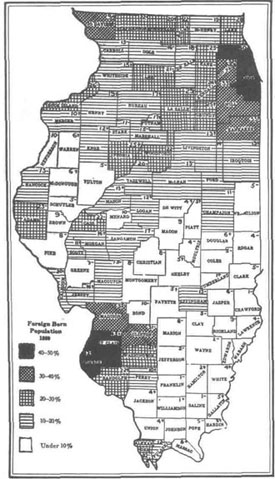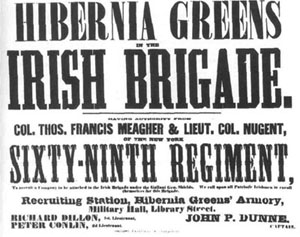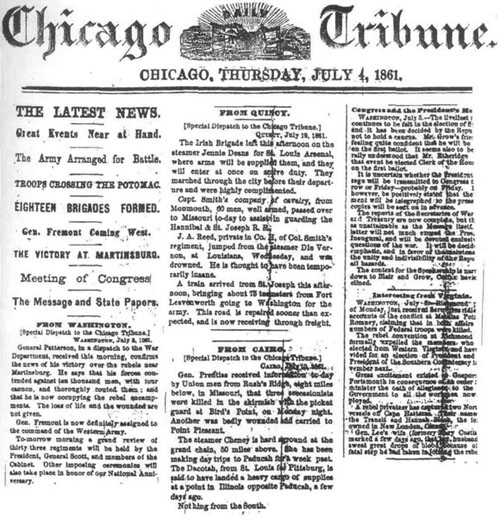 |
Home | Search | Browse | About IPO | Staff | Links |
 |
Home | Search | Browse | About IPO | Staff | Links |
Robert Krey
Overview
Main Ideas In the Civil War, 259,092 soldiers from Illinois served the Union cause comprising 150 regiments of which five were ethnic— two Irish and three German. Ethnic regiments were organized around popular or political leaders. The ability of these leaders to recruit troops depended on their political power and their ability to appeal to the national heritage of the volunteer. Illinois' ethnic soldiers served in all branches of the Union armed forces and in both the eastern and western theaters of war. Most of the ethnic soldiers served in the western arena, either in the Army of the Tennessee under Ulysses S. Grant or the Army of the Cumberland under William Rosecrans' command, later replaced by William Tecumseh Sherman. The following activities involve students in various stages of an ethnic soldier's participation in the Civil War.
Connection with the Curriculum
Teaching Level
Materials for Each Student
• A copy of the narrative portion of this article
Objectives for Each Student
• Understand the diversity of the population of Illinois by analyzing historical data.
The activities are designed to take an ethnic soldier from enlistment to actual involvement in the Civil War. All or some of the lessons may be used depending on the dictates of the established curriculum and other lesson plans.
Opening the Lesson
• Ask the students to read the narrative portion of this article.
Developing the Lesson
Concluding the Lesson
• Handout 1: 20 percent of Illinois residents were of ethnic origin.
Extending the Lesson
• Determine when your community's newspaper began, and examine how it reported the Civil War.
Assessing the Lesson
• Assess each activity individually based on its individual merits.
6
Review the map below and answer the questions on the following page.

Foreign Born Population in Illinois, 1860
Source: Arthur Charles Cole, The Era of the Civil War, 1848-1870 (Urbana: University of Illinois Press, 1987)
7
8
Using the poster below as a model, develop and draw your own recruiting poster that would attract ethnic volunteers. Be sure to refer to the narrative portion of this article for ideas. Students within each group can divide responsibilities according to their skills. For example, students who are good at drawing can draw the poster, while students who are good at writing can write the words for the poster.

9
Review the front-page articles below from the Chicago Tribune. Divide students into four groups. Each group will make a part of a front page of a newspaper that could have existed in Illinois during the 1860s. Have each group use information from the narrative portion of this article. Group 1 — Report on the Forty-third Illinois Infantry fighting at Shiloh.
10

11
Ask students to assume the role of an ethnic soldier who has just survived a battle. They should write a letter to their parents in Chicago, using the writing style of the period and the vocabulary. The writing style of the 1860s consisted of two key elements, making it distinctive from today's writing: (1) no contractions were used, and (2) most words for the ordinary soldier were spelled as they sounded. Including some of the words from this vocabulary list, write a letter home to your parents in Chicago. Period Slang bogus—false, or a mill or stamp for counterfeiting coins bub—a fellow or man, probably derived from the German word "bube", a small boy bite the bullet—to stand firm, from the British in the 1850s finagle—to be cheated hornswoggle—to be cheated kit and kaboodle— the whole thing likeness—a photo salthorse—pickled beef sowbelly—salted pork skippers—maggots infesting army meat sea biscuits—army hard bread or crackers worm castles—maggot infested hardtack johnny cakes—cornbread grey back—body lice shakes—malaria croaking—to complain constantly flux—diarrhea saw the elephant—been in battle grab a root—to take cover under fire gobbled up—taken prisoner shebang—a shelter made of brush or cornstalks rubbed out—tired argee—bad whiskey searching for happiness—to pick lice out of your clothing skillygalee—hardtack soaked in water and fried in bacon grease fresh fish—a raw recruit open the ball—start the battle bumblebee—a fired bullet change your breath—to drink not on your tintype—certainly not Click Here to return to the Article 12 |
|
|